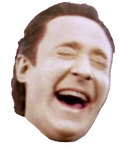It's extremely relevant. Russia is the other major source of this type of crude. When Venezuela was selling it to China (because the US would not purchase it directly), China, just redelivered it to US refineries and pocketed the transport costs. But with Russian crude cut off, they wanted an excuse to directly import from Venezuela again while cutting the Chinese out of the equation.
Maturin
joined 2 years ago
You’re not going to like it but it is “Daddies’ Long Leg”
Yeah there feels like there is an anti-tankie aktion going on in the fediverse this week. Maybe it’s always like that and I just stay cozy over here.
Increased surface area is not the reason for this. Cutting the garlic breaks some of the cells and it releases chemicals that react with each other create the "hotter" taste. The more you cut it before cooking the more of the chemicals are released. https://www.thegarlicfarm.co.uk/blogs/news/cooking-with-garlic-1
God is gay [compliment]
The star historically was not considered a broad symbol representing all Jews. It was essentially created as such by the early Zionists.
The US has been a full-blown military junta since ~~1963~~ 1775
view more: next ›




Next they are going to say it wasn't even his machine gun